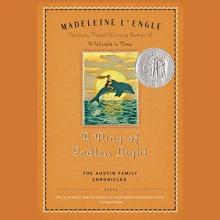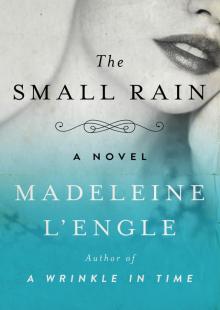- Home
- Madeleine L'engle
Dragons in the Waters
Dragons in the Waters Read online
For Robert Giroux
Table of Contents
Title Page
1 - THE FORK LIFT
2 - THE FIRST NIGHT AT SEA
3 - THE WORD “UMAR”
4 - A STRANGE GAME OF BRIDGE
5 - NOCTURNE
6 - THE BOLIVAR PORTRAIT
7 - THE HEARSE
8 - MURDER
9 - PORT OF CALL
10 - THE BODY IN THE HEARSE
11 - THE LAKE OF DRAGONS
12 - THE RETURN OF THE PHAIR
THE WORKS OF MADELEINE L’ENGLE
A House Like a Lotus
Copyright Page
1
THE FORK LIFT
The M.S. Orion was tied up at Savannah, Georgia.
Simon Renier, hands in the pockets of his old-fashioned grey shorts, looked at the small white ship with mounting excitement. He would be spending the next week on the Orion en route to Venezuela and already, standing on the pier in Savannah, he was farther away from home than he had ever been in his thirteen years.
It was chill this February day, with a thin rain and a biting wind. In a more sheltered part of the dock stood his cousin, Forsyth Phair, with whom he would be traveling, and his great-aunt Leonis Phair, with whom he lived, and who had come with them on the train from Charleston to see them off. Simon looked at the two of them standing under the shelter of the shed and their umbrellas and thought that if he were traveling with Aunt Leonis instead of Cousin Forsyth he would be perfectly happy.
Aunt Leonis was comfort and all-rightness in a precarious world; Cousin Forsyth he had known for barely a month, and while the distinguished-looking middle-aged man was courteous and pleasant he was not outgoing and to Simon he was still a stranger. He looked damp and uncomfortable with the rain dripping off his large black umbrella, and the collar to his dark raincoat turned up. Even the corners of his waxed moustache seemed to droop. The old woman, on the other hand, stood straight as an arrow, unperturbed by the downpour.
“Can’t you come, too?” Simon had begged her.
“I’m too tired, child,” the old woman had said. “At ninety I’ve earned the right to my rocking chair and my books. Besides, I have to stay home and take care of Boz.” The old dog in pointer years was almost as old as Aunt Leonis. His proud skeleton showed under the still-glossy liver-spotted body, and Simon felt a tightening of his stomach muscles as he realized that the old hound might not be there when he returned.
He turned his face into the rain and moved farther away from Aunt Leonis and Cousin Forsyth, past the gangplank of the Orion, and on down the dock. All around him was activity, the tall yellow arms of the Orion swinging sacks of seed and grain and rice up onto the ship, to be stored in the hold. Simon watched in fascination as a large station wagon was carefully hoisted up from the dock, swung loose for a moment high in the air, then was lowered gently onto the foredeck.
On the aft deck stood the passengers who had already embarked at Brooklyn or Baltimore, eagerly watching the business of loading the freighter. A few of them waved at him, and he waved shyly back. Then he turned to watch the orange fork lifts buzzing rapidly up and down the dock, the two long tines of their forks fitting neatly into the small wooden platforms onto which bags and bales were piled. Great yellow arms swung out from the Orion, dropping heavy ropes which were looped around sacks and platform; the crane raised its burden to the ship’s foredeck, and the highly mobile fork lift darted away, moving far more easily than an ordinary tractor, turning on a dime to reach for another load. The sailor managing the long-angled pincers from his glassed-in cab high up on the Orion swung the bags and sacks with easy accuracy. Everywhere was bustle, and men’s shouting, and the smell of wet wood and the salt wind from the sea. Simon would be almost sorry when they boarded, so fascinating was the loading procedure.
He jumped as he heard a horn, and a Land Rover drove onto the dock, full of children who kept piling out, like clowns out of a car at the circus. Simon found it difficult to keep count, but it appeared to be a mother and father and seven children. After considerable shouting and laughing, the two older children, a girl and a boy, sorted themselves out, managed to get two battered suitcases from the Land Rover, and came to stand not far from Simon. The mother urged the younger children back into the car, out of the rain, and the father, rain dripping off his cap, stood leaning in the window, talking to the mother.
The girl, banging her old suitcase against her knees, dropped it by the gangplank and came on down the dock toward Simon. Her brother followed. She was, Simon guessed, maybe a year older than he was, maybe fourteen, and probably would resent being called a child. The boy looked younger, although he was as tall as Simon, who guessed him to be no more than twelve. Both brother and sister wore yellow slickers and sou’westers, and were considerably drier than Simon, whose fair hair was slicked wetly to his head.
“Hello,” the girl said. “Are you going on the Orion?” Her accent was not quite foreign, but it was certainly more precise than the soft Southern speech Simon was accustomed to hearing.
“Yes’m. Are you?”
“Yes. At least, Charles and Daddy and I are.” She smiled, a swift spreading of sunlight over her face. “How nice to have someone our age. Daddy warned us that freighter passengers tend to be ancient. I’m Poly O’Keefe, pronounced Polly but spelled with one /. I’m fourteen. And this is my brother, Charles. He’s twelve.”
So he had been right. “I’m Simon Renier, and I’m thirteen.”
Again Poly smiled, a shaft of light lifting the drab day. “You’re not traveling alone, are you?”
He indicated the man and the old woman. Suddenly Cousin Forsyth stepped forward as one of the fork lifts picked up a large flat wooden crate. He watched anxiously as ropes from the Orion were looped around it. “Be very careful,” he fussed. “It’s extremely valuable. It contains an irreplaceable portrait.”
The dock hands nodded indifferently as they went about their business. The fork lift backed away from the crate, which was then lifted up in the air and hung swinging between the ship and the dock.
“What’s in there?” Poly asked Simon. “Your father looks as though he’s about to have a heart attack.” The horn of the Land Rover tooted before Simon could answer or correct her. “We have to say goodbye!” Poly cried. “We’ll be back in a minute, Simon!” and she and Charles ran across the dock, dodging loading trucks and fork lifts.
Simon watched rather wistfully while there was a tangle of hugging and kissing goodbye. Then he looked up at the Orion just in time to see the great crate with the portrait being safely lowered onto the deck, and Cousin Forsyth mopping his forehead with his handkerchief as though it were hot.
Aunt Leonis was still standing in the shelter of the shed and her small, not very waterproof umbrella. Simon ran over to her, skidding on the wet boards. “Where’s Cousin Forsyth going?”
“He’s off to make sure the portrait isn’t going to get banged or crushed. I certainly can’t complain about his care of it. He’s overzealous, if anything.” She put her gnarled old hand on his head. “You’re soaking, Simon!”
“Yes, ma’am.”
“You’ll be boarding in a minute or two. You’re old enough to take care of yourself without me, aren’t you?”
“Yes, ma’am.”
“And don’t let Forsyth overprotect you. He can keep that for the portrait. I want you to have some fun.”
He leaned lightly against her. “I’ll miss you.”
“It’s time you got out of the nest, child. A nonagenarian is hardly a fit companion for a boy. I’m glad there are other young persons on board.”
“Yes, ma’am!”
“I’m going now, Simon. I have a train to catch.
” She was still taller than he was. She bent down, and he kissed her softly on each cheek. For a brief moment she held him to her. Then she stood upright and gave him a little shove. “Run along, now.”
Tears filled his eyes. He did not want her to see. Moving in a blur of tears and rain, he crossed the dock. He paused at the gangplank but the tears would not be held back. Poly and Charles had said their goodbyes and were hurrying along the dock toward him.
No one must see him cry.
He moved on past the gangplank, past the stern of the Orion, on to the very end of the dark, slippery dock. He did not see the fork lift, out of control, hurtling toward him.
Someone on deck screamed.
He felt a shove, and then both he and Poly O’Keefe were in the water.
The fork lift ground to a screeching halt, barely avoiding crashing off the dock after them.
The water was icy cold. Their clothes dragged them down.
From the deck of the Orion round orange life preservers were thrown into the water for them, but both Simon and Poly had managed to grab on to the pilings of the dock and were clinging to them safely. Dock hands pulled them up out of the chilling water, and they stood dank and dripping in the February rain.
The driver of the fork lift kept explaining that his accelerator had stuck.
The shivering boy and girl were surrounded by the entire O’Keefe family, by sailors and dock hands. Aunt Leonis used her umbrella to get through the mob to Simon. Through chattering teeth he said, “I’m all right, Aunt Leonis. Please don’t miss your train.”
The old woman turned her sharp eyes on Poly. “I saw. You saved him. If you hadn’t thrown yourself at him and got him out of the path of the fork lift he’d be—” She looked at the vicious prongs of the fork lift and did not finish her sentence. She turned to the father of the family. “You will watch out for him, sir? I am gravely concerned.”
Dr. O’Keefe replied, “Of course I’ll keep an eye out for him. But I don’t think you need worry. It was only an unfortunate accident.”
Aunt Leonis looked at him sharply, but all she said was, “Where is Forsyth? If he’s going to worry about the portrait to the exclusion of the boy—”
The captain of the ship came running down the gangplank, followed by a youngish man with officer’s bars on his dark sleeve. “I am Captain van Leyden, and this is my first officer, Mynheer Boon.”
Mynheer Boon smiled and draped heavy blankets over Poly and Simon.
Van Leyden said, “Boon will get the children aboard and help them. Order hot tea, too, please, Boon.”
Simon held out his hand. “Goodbye, Aunt Leonis.” His voice faltered slightly. He hoped that this would be attributed to the cold.
Aunt Leonis shook his hand formally. Then she said to Dr. O’Keefe, “I do not think that I am being just a foolish old woman.” To Poly she said, “I am much obliged to you, Miss—”
“Poly O’Keefe. It wasn’t anything.”
Aunt Leonis said, “It was.”
To Simon’s surprise Charles O’Keefe looked directly at the old woman and replied, “Yes. It was.”
Miss Leonis’s old eyes were clouded with more than age as she watched Simon’s dripping, blanket-covered form trudge damply up the gangplank. Poly O’Keefe and her brother and father were ahead of Simon; Forsyth Phair, who had emerged from the ship just in time for farewells, was behind, fussing over Simon in much the same nervous way he had fussed over the portrait. It was apparent that the boy was being taken care of. The nice Dutch officer would see to it that he got hot tea and changed to dry clothes. There was nothing more she could do. She walked slowly along the dark, wet boards of the dock.
Mrs. O’Keefe was trying to herd her excited younger children into the Land Rover. She saw the old woman struggling along, wind tugging at her ancient umbrella. “Is there anywhere I can drop you? A Land Rover’s not the most comfortable vehicle in the world, but at least you’ll be out of the rain.”
Miss Leonis looked at the younger woman, and at the children, who had stopped their chattering and were staring. “Thank you. I should be much obliged if you’d take me to the railroad station. I think I may not have missed my train.”
“Sandy, Dennys, help Mrs.—” She paused.
“Phair. Miss Leonis Phair. I can manage quite nicely myself, thank you just the same, young gentlemen.” With the help of her now-furled umbrella she pulled herself briskly onto the high seat of the Land Rover.
Mrs. O’Keefe asked, “Can we drive you any farther than the station?”
“Thank you, no. I am taking the train to Charleston.”
Mrs. O’Keefe turned around in the car and looked back at her children, then smiled at the old woman. “What with all the excitement at the dock I think it very likely that you’ve missed your train, and I’ve been promising the children a visit to Charleston for ages. We’d be delighted to drive you there. Now that my husband has gone off for a month with Poly and Charles, surely everybody else deserves a special treat.”
There was a loud noise of agreement.
Miss Leonis looked at Mrs. O’Keefe, who was now smiling serenely. “I am much obliged to you. You are very kind.”
“Not at all. It’s you who’ve given us the opportunity for sightseeing, and the weather report promised sun late this afternoon, and the rain’s beginning to slacken off already. Do you live right in Charleston?”
“Out in the backwoods.” The old woman’s next words seemed to be audible thinking, rather than conversation. “I hope I have made the right decision. It is not normal for a young boy to live all alone with an old woman.” Then she pulled herself together and spoke briskly, “I would be delighted to give you a conducted tour of Charleston, and then perhaps you will drop me off on your way home—you do live north of Savannah?”
“Yes. Benne Seed Island.”
Leonis Phair turned around and stared solemnly at the children. “I hope you young ones have stamina. You may find me difficult to keep up with.” There was stifled giggling as she asked Mrs. O’Keefe, “Your husband will keep an eye on Simon?”
Mrs. O’Keefe turned the car away from the dock area and onto the highway. “Of course he will. He’s used to having a mob of children to keep track of.”
“It will make me easier in my mind. Simon has never been away from home before. And that was not a propitious beginning.”
Mrs. O’Keefe said lightly, “If he and Poly needed an introduction, that was sure-fire. They’re probably the best of friends by now.”
Miss Leonis was silent for the next mile. Her gnarled hands held the umbrella handle, and she tapped the steel tip thoughtfully on the floorboards. Then she spoke quietly. “Your daughter saved Simon’s life. I shall not forget that.”
On the M.S. Orion, Simon and Poly in their separate cabins were changing out of their soaking clothes. Simon, alone in the double cabin he was to share with Cousin Forsyth, wondered if Dr. O’Keefe or Charles was helping Poly.
Forsyth Phair had said, “Take a good hot shower, Simon, and wash your hair. That water by the dock in which you chose to swim can hardly have been very clean.”
Simon did not reply that the swim had not been of his own choosing.
“And dress in warm clothes. I don’t want you coming down with a cold right at the beginning of the trip. I am very susceptible to colds.”
“Yes, sir.”
“I must go tend to the portrait now. One of the boards on the crate came loose as it was being loaded. Captain van Leyden says that since cabin 5 on the port side of the ship is unoccupied until Caracas, the portrait can be stored there. I certainly wouldn’t trust it with the rest of the cargo.” And off he fussed.
Simon stood for a long time under the hot shower, not so much to wash off the oily waters as for comfort. The noise of loading and unloading continued outside his portholes; the ship was still safely berthed in Savannah but he felt very far from home. What had seemed like a great adventure only a few hours ago now gave him a cold feeli
ng in the pit of his stomach and an ache around his heart.
He wanted Aunt Leonis.
Not that Cousin Forsyth wasn’t kind. But Simon found it odd that it was the middle-aged bachelor who had suggested that the boy accompany him on this voyage.
He got out of the shower, dried, and put on his seersucker bathrobe. Cousin Forsyth had said, ‘There’s no point in packing winter things. After the first or second day at sea it’s going to be summer.’
Simon shivered. His soaking blazer was the warmest thing he had. “Come in,” he called to a tap on the door.
It opened to a young man, barely out of boyhood, with dark hair and eyes, who was wearing a white coat. He bore a small tray with a pot of steaming tea, and some buttered rusks with Gouda cheese.
Simon smiled his thanks and asked the young man’s name.
“Geraldo Enrique Armando José Ramírez. I am the assistant steward, at your service. You are Sim6n Renier?”
“Simon Bolivar Quentin Phair Renier. We have the same number of names. I pronounce Simon the English way instead of the Spanish way.”
Geraldo poured tea for Simon, put in lemon and sugar. “But you are named after the great General?”
“Yes,” Simon said, and shivered.
Geraldo looked at the boy in his inadequate cotton robe. “You have nothing warmer?”
Simon pawed through his suitcase and pulled out a lightweight sleeveless pullover.
Geraldo shook his head. “That is not enough, and it will be tomorrow before I have your wet things cleaned and pressed.” He sounded like an old man. “Drink your tea, please, while it is hot. I will return.”
The steaming, lemony tea warmed Simon inside and out. He sipped and unpacked and ate the rusks and cheese and unpacked some more, taking care to leave most of the drawer and wardrobe space for Cousin Forsyth. He knew that Cousin Forsyth would have preferred a single cabin, but when they had booked passage the two single cabins on the Orion were already taken, one by Poly.
There was, however, plenty of room for two. The bunks were divided by a sizable chest of drawers, and Simon took the bottom drawer. Cousin Forsyth had already put his briefcase on the bunk on the inner wall, so Simon had the bunk under the two portholes. This would have been the bunk of his choosing, and he would not have felt free to take it if Cousin Forsyth had not established himself on the other.

 Love Letters
Love Letters The Summer of the Great-Grandmother
The Summer of the Great-Grandmother A Wrinkle in Time
A Wrinkle in Time The Young Unicorns
The Young Unicorns Two-Part Invention: The Story of a Marriage
Two-Part Invention: The Story of a Marriage The Other Side of the Sun
The Other Side of the Sun A House Like a Lotus
A House Like a Lotus Certain Women
Certain Women Many Waters
Many Waters Camilla
Camilla A Ring of Endless Light
A Ring of Endless Light Meet the Austins
Meet the Austins Dragons in the Waters
Dragons in the Waters The Small Rain
The Small Rain The Moment of Tenderness
The Moment of Tenderness A Wind in the Door
A Wind in the Door Miracle on 10th Street
Miracle on 10th Street The Moon by Night
The Moon by Night A Swiftly Tilting Planet
A Swiftly Tilting Planet An Acceptable Time
An Acceptable Time A Severed Wasp
A Severed Wasp The Irrational Season
The Irrational Season A Circle of Quiet
A Circle of Quiet A Live Coal in the Sea
A Live Coal in the Sea Troubling a Star
Troubling a Star Walking on Water: Reflections on Faith and Art
Walking on Water: Reflections on Faith and Art A Wrinkle in Time Quintet
A Wrinkle in Time Quintet Wrinkle in Time
Wrinkle in Time The Wrinkle in Time Quintet
The Wrinkle in Time Quintet Intergalactic P.S. 3
Intergalactic P.S. 3 Walking on Water
Walking on Water Bright Evening Star
Bright Evening Star The Rock That Is Higher
The Rock That Is Higher Madeleine L'Engle Herself
Madeleine L'Engle Herself The Arm of the Starfish
The Arm of the Starfish And Both Were Young
And Both Were Young The Twenty-four Days Before Christmas
The Twenty-four Days Before Christmas And It Was Good
And It Was Good A Stone for a Pillow
A Stone for a Pillow Do I Dare Disturb the Universe?
Do I Dare Disturb the Universe? Sold into Egypt
Sold into Egypt A Wrinkle in Time (Madeleine L'Engle's Time Quintet)
A Wrinkle in Time (Madeleine L'Engle's Time Quintet)